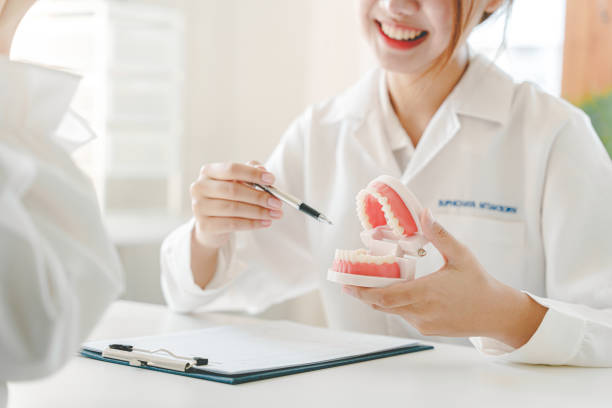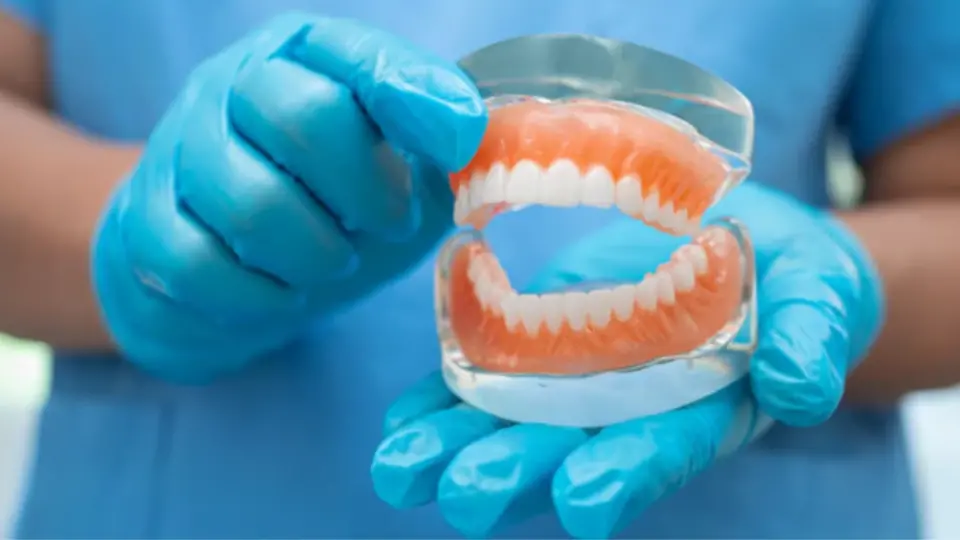What to Expect After Getting New Dentures: Adjusting to Life with a New Smile

Getting new dentures is an exciting step toward restoring your smile, but it’s normal to wonder what life will be like with them. Adjusting to dentures takes a little time and patience, but knowing what to expect can make the transition easier.
Whether you’ve replaced a few teeth or have a full set, your new dentures will feel different at first—there may be some soreness, changes in speech, or a bit of discomfort as you get used to them.
The good news? With each passing day, things improve, and soon, your new smile will feel like second nature. With the right mindset and a little patience, you’ll be smiling, speaking, and eating with confidence in no time.
How long does it take to adjust to new dentures?
Adjusting to new dentures typically takes a few weeks to a few months, depending on individual factors and the type of dentures you receive. Here’s a general timeline of what to expect:
First Few Days
- Initial Discomfort: It’s common to experience soreness, irritation, or a feeling of fullness in your mouth. Most people find their gums sensitive as they adapt to the dentures.
- Learning Curve: You may also notice changes in your speech and eating habits, requiring some practice to get used to chewing and talking with your new dentures.
First Few Weeks
- Gradual Adjustment: Many individuals find that the discomfort decreases significantly within two to four weeks, and they become more accustomed to wearing their dentures. During this time, soft foods are recommended to ease the transition.
- Follow-up Appointments: Regular check-ins with your dentist during this period can help address fit issues or discomfort.
One to Three Months
- Full Adaptation: Most people fully adjust to their dentures within one to three months. By this time, eating and speaking should feel more natural, and any initial discomfort should have been resolved.
- Ongoing Care: Even after adjustment, it’s important to maintain regular dental check-ups to ensure the fit remains comfortable and make any necessary adjustments as your gums and mouth shape changes.
Patience is key during this transition period, and staying in touch with your dentist for support and guidance can make the adjustment smoother.
What are common challenges when getting used to new dentures?
Getting used to new dentures can present several challenges as your mouth adapts. Here are some common issues you may encounter:
- Discomfort and Soreness: Initially, your gums may experience soreness as they adjust to the pressure of the dentures. This discomfort usually subsides over time.
- Loose Fit: New dentures may feel loose or unstable, leading to concerns about movement while speaking or eating. If this persists, consult your dentist for adjustments.
- Difficulty Eating: Adjusting to chewing with dentures can be challenging. You should start with soft foods and gradually introduce more solid options as you become comfortable.
- Changes in Speech: Many individuals notice changes in their speech patterns, including slurring or difficulty pronouncing certain sounds. Practice speaking out loud to improve clarity.
- Increased Salivation: Your mouth may produce more saliva initially, which can be uncomfortable. This usually normalizes as you adjust to wearing dentures.
- Gum Irritation: Some users experience irritation or sores on their gums due to friction from the dentures. Proper cleaning and regular dental visits can help manage this issue.
By understanding these challenges and seeking support from your dentist, you can navigate the adjustment period more smoothly.
How should you care for new dentures during the adjustment period?
Caring for new dentures during adjustment is crucial for comfort and oral health. Here are some essential tips for proper care:
- Daily Cleaning: Clean your dentures daily using a soft-bristle toothbrush specifically designed for dentures. Avoid using regular toothpaste, as it can be abrasive; use a denture cleaner instead.
- Soaking: When not wearing your dentures, soak them in a denture solution or plain water to prevent them from drying out and losing shape.
- Gentle Handling: Carefully handle your dentures to avoid bending or breaking them. Always clean them over a soft surface or a towel to minimize damage if they are dropped.
- Rinse After Eating: After meals, rinse your dentures to remove food particles and prevent buildup. This helps maintain hygiene and freshness.
- Avoid Adhesives Initially: During the adjustment period, avoid denture adhesives unless your dentist recommends them. This allows your gums to adjust without added pressure.
- Follow-Up Appointments: Attend all scheduled follow-up appointments with your dentist for adjustments. Regular check-ins can help address fit issues and ensure your comfort.
Following these care tips can help ease the transition to wearing dentures and promote good oral health.
What can you eat after getting new dentures?
After getting new dentures, choosing the right foods is essential to ease the adjustment process. Initially, you may need to stick to softer foods to avoid discomfort and help your gums acclimate. Here are some food options to consider:
- Soft Fruits
- Bananas, applesauce, and ripe peaches are gentle on your gums and easy to chew.
- Cooked Vegetables
- Steamed or boiled vegetables like carrots, squash, and broccoli are soft and nutritious. Until you feel more comfortable, avoid raw or hard vegetables.
- Grains
- Soft bread, oatmeal, and cooked pasta are great options. To prevent discomfort, ensure that the bread is not crusty or hard.
- Dairy Products
- Yogurt, soft cheeses, and pudding are excellent sources of calcium and easy to consume without irritation.
- Protein Sources
- Scrambled eggs, soft fish, and tender cuts of meat (finely chopped or shredded) provide necessary protein without chewing too much.
- Soups and Broths
- Warm, not hot, soups can be soothing and easy to eat. Until you’re more comfortable, avoid chunky soups.
As you adjust, gradually introduce firmer foods and cut food into smaller pieces to make chewing easier.
Embrace Your New Smile with the Right Dentures!
Embrace your new smile with confidence at Illume Dental of McKinney! Adjusting to dentures is a journey, and our compassionate team is here to support you every step of the way.
We understand that the transition can come with challenges, from discomfort to changes in eating and speaking. We provide personalized care and guidance to help you adapt smoothly. Our experts will offer valuable tips and follow-up appointments to ensure your dentures fit comfortably and function effectively. E
njoy the benefits of your new smile and a renewed sense of confidence. Contact us today to learn more!



